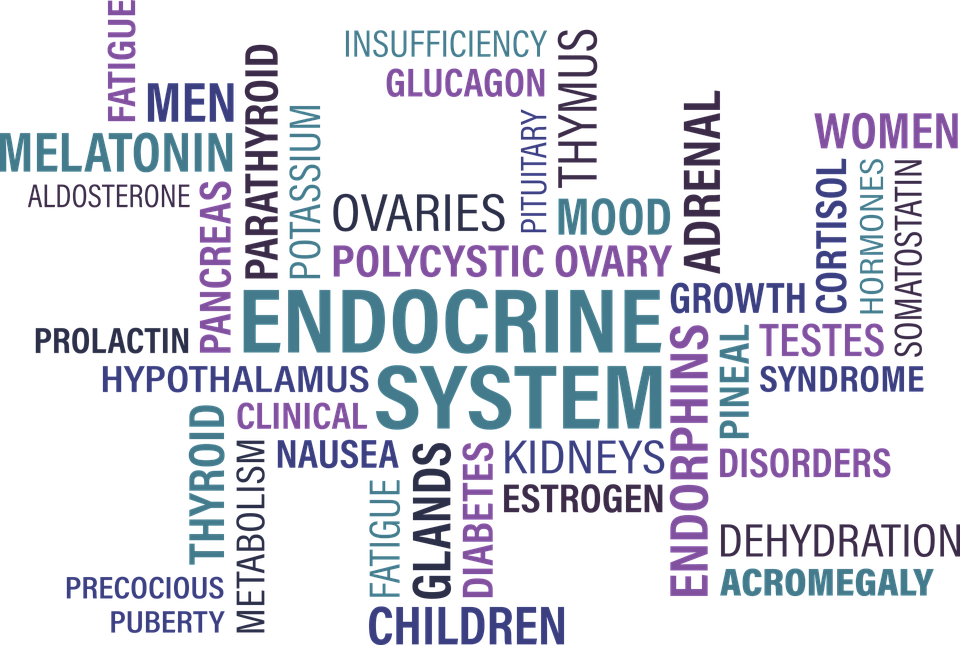The Importance of Healthy Thyroid Function

Did you know that more than 12% of Americans will develop a thyroid condition, such as hyperthyroidism, at some stage in their lives? Also, nearly 60% of the 20 million Americans with thyroid disease might not know that they have the condition, which is concerning. Thyroid function is important for your health.
While you cannot do anything to guarantee that you will not get thyroid disease, you can certainly make choices and take lifestyle decisions that will lower your risk of developing a thyroid condition.
What is the Thyroid?
Your thyroid is a butterfly-shaped gland in the neck that controls or regulates how each cell in your body consumes energy. One of the thyroid’s primary functions is to produce hormones, such as triiodothyronine (T3) and thyroxine (T4), which help regulate your body’s metabolism. Many of the bodily functions slow down and become less efficient when your thyroid gland fails to produce enough of these hormones. In this case people need thyroid support supplements.
What Causes Thyroid Problems?
Many different problems and complications can develop when your thyroid produces an excess hormone (hyperthyroidism) or not enough (hypothyroidism). Note that when your thyroid is overproducing or underproducing, it may cause troublesome symptoms like irritability, weight loss, fatigue, and weight gain.
Other common issues and complications associated with the thyroid include Graves’ disease, Hashimoto’s thyroiditis, thyroid nodules, and goiter.
Lifestyle and Thyroid Function
Many factors may affect healthy thyroid function and thyroid test results, including:
- Sleep deprivation
- Stress
- Dieting
- Nutrient deficiencies
- Oxidative stress
- Different times of your menstrual cycle
Medication Use and Thyroid Functioning
Certain medications, such as antidepressants, can cause thyroid dysfunction. Some medications and drugs may interfere with your thyroid hormone levels, while others may affect their action.
This may change the thyroid stimulating hormone. This is because your body might try to compensate for the low or high thyroid hormones. For instance, stopping or starting oral contraceptives may make a notable difference in the quantity of thyroid hormone that your body requires. Also, medications that contain calcium or iron can affect absorption. In these situations, experts recommend thyroid support supplements.
Pregnancy and Menopause
You will still need to take your thyroid medication after becoming pregnant. Actually, you may need more as you and your developing baby need it for healthy functioning. Like pregnancy, menopause may also impact your hormone levels.
Common Types of Thyroid Problems and Disorders
The main kinds of thyroid problems and complications are:
Hyperthyroidism
This happens when your thyroid is overactive and produces too much thyroid hormone. Some of the most common symptoms and signs of hyperthyroidism are feeling nervous or anxious, not being able to tolerate heat, experiencing heart palpitations, and feeling tired. Hyperthyroidism is also known as thyrotoxicosis.
Other signs and symptoms include:
- Weight loss
- Hair loss
- Diarrhea/loose stools
- Tachycardia/arrhythmia
- Insomnia
Hypothyroidism
This happens when your thyroid is underactive and does not produce sufficient thyroid hormone. Did you know that hypothyroidism can go on for many years without showing any symptoms or signs?
However, when symptoms show up, they can be pretty varied and may include being unable to tolerate the cold, dry skin, constipation, and depression.
Too little hormone production can also lead to other symptoms, such as:
- Fatigue
- Dry hair
- Memory problems
- Weight gain
- Slow heart rate
- Irregular and heavy menstruation
Thyroid Cancer
Thyroid cancer is a rare kind of cancer that impacts your thyroid gland. This happens when some of the thyroid cells change and become cancerous. It is worth noting that thyroid cancer is more prevalent in women than men. Also, it is generally diagnosed when people are in their fifties.
Here are some of the common signs and problems:
- Throat and neck pain
- Lump in the neck
- Difficulty swallowing
- Cough
- Vocal changes
Thyroid Dysfunction and Stress
You should know that your thyroid works together with your adrenal glands. These glands are above your kidneys and can handle small to moderate amounts of stress well. And when you experience stressful situations, they release cortisol, enhancing various bodily functions.
However, inflammation and chronic stress increase your body’s need for cortisol. Higher levels of cortisol in your body are catabolic. This means they decrease lean body mass and muscle mass while increasing energy expenditure.
This may cause joint and muscle pain, extreme fatigue, and sleeplessness. They can also cause high blood pressure.
The most prevalent thyroid disorders are autoimmune disorders. In these cases, your body attacks its own tissue, which is the thyroid gland. Graves’ disease and Hashimoto’s thyroiditis are two examples.
Graves’ disease can cause your thyroid to be overactive. On the other hand, Hashimoto causes it to become underactive.
When your thyroid function slows during stress, there is a decrease in thyroxine (T4) and triiodothyronine (T3) levels. And the conversion of the T4 hormone to the T3 hormone may not occur, causing higher levels of reverse T3. You should not shy away from using expert help and talk to your doctors about thyroid support supplements. And nothing but also natural thyroid support supplements.
Mental stressors, such as financial insecurity, job worries, or health problems, may trigger the same onset in your body and release stress hormones.
The Complications of Thyroid Problems
If you’ve a thyroid problem, such as hyperthyroidism, which is not treated properly or timely, serious health complications and consequences can result. For instance, an overactive thyroid can lead to numerous problems, such as bulging eyes and double or blurred vision.
The only accurate and reliable way of determining whether you’ve a thyroid issue is to have a thyroid function test.
How to Improve Thyroid Function
Stop Smoking
You may know that cigarette smoke contains various toxins that can impact your thyroid gland. One of these toxins is thiocyanate. This compound is harmful and disrupts iodine uptake, blocking the production of thyroid hormones.
Generally, smoking can lead to elevated levels of the common thyroid hormone thyroxine (T4). You should ask your doctor about treatment options to help you successfully quit smoking.
Discuss Supplements with Your Doctor
Selenium Supplements for Better Thyroid Function
Selenium is a nutrient commonly found in specific proteins. Of all the organs, the thyroid has the greatest concentration of selenium in the human body. You will be able to prevent thyroid disease by ensuring that you get enough of this important nutrient.
Dr. Nandi’s Thyroid Support
Dr. Nandi’s Thyroid Support is a comprehensive and reliable formulation that offers a combination of nutrients and botanicals that work together to support thyroid health and improve your well-being. Thyroid Support increases levels of thyroid hormones, triiodothyronine (T3) and thyroxine (T4). Low thyroid hormones can impact your body’s vitamin levels. We recommend you only the thyroid support supplement.
Taking Thyroid Support will help you repair the damage hypothyroidism causes. The supplement also lowers oxidative stress and promotes a healthy thyroid gland. We recommend nothing but the best thyroid support supplements for our patients for thryroid support.
This comprehensive thyroid formula contains minerals, vitamins, and herbal extracts, such as Ashwagandha, to support and nourish thyroid gland function and improves cellular sensitivity to various thyroid hormones.
Optimal vitamin A, zinc, and selenium also help maintain healthy and effective thyroid cell support and metabolism triiodothyronine (T3) and thyroxine (T4) hormone function. The formula increases the conversion of T4 to T3 and helps maintain a healthy thyroid hormone balance. This is an example for what compromises of a good thyroid support supplement.
Iodine
Thyroid Support contains iodine and L-tyrosine. Iodine is a crucial trace mineral. It is necessary for synthesizing thyroid hormones.
Your thyroid absorbs iodine from the blood. After that, it incorporates iodine into thyroid hormones. Iodine is an antioxidant and supports a healthy thyroid gland.
Zinc, Selenium, and Vitamin A
The formula also contains zinc, selenium, and vitamin A. It also has the botanical guggulipid that activates enzymes, enhancing and facilitating the conversion of T4 into the important thyroid hormone T3. You also need zinc and selenium to convert T4 to T3.
Selenium supplementation can help decrease thyroperoxidase (TPO) antibodies in thyroid autoimmunity. On the other hand, zinc can restore T3 levels in people with standard T4 and low T3. Zinc and Vitamin A also help improve cellular sensitivity to several thyroid hormones.
Turmeric
Turmeric and various antioxidants, such as vitamins C and E in this formula boost and strengthen thyroid health by lowering free radical stress. They also promote a healthy thyroid gland because of direct antioxidant activity.
Ashwagandha
Thyroid Support combines iodine-containing plants with various adaptogenic herbs, helping smooth your stress response cycle. Ashwagandha has been used in indigenous medical and Aryuvedic systems for more than 3,000 years and is well-known for its stress-lowering effects.
Ashwagandha is also valuable as it may stimulate thyroid activity indirectly through its effects on your cellular antioxidant systems. This is achieved by increasing the antioxidant enzymes catalase and superoxide dismutase and lowering lipid peroxidation.
Guggulipid
Guggulipid can support thyroid function and health primarily by lowering lipid peroxidation in your liver, which is the leading T3 generation site. Guggul extract has thyroid-stimulating action. It does this by improving iodine uptake by your thyroid gland.
Thyroid Function: Summarized
To keep your thyroid functioning as it should, here are some key takeaways:
- Avoid sugar and inflammatory foods, such as gluten
- Eat within 12 hours or less and at least 2 hours before sleeping
- Identify your stressors and prioritize what is most important in your life
- Participate in activities you enjoy
- Spend time outside or in nature
- Try to sleep seven to eight hours each night
Sources
https://www.thyroid.org/media-main/press-room/
https://www.thyroid.org/graves-disease/




